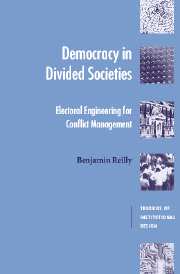Book contents
- Frontmatter
- Contents
- List of illustrations
- List of tables
- Acknowledgements
- List of abbreviations
- 1 Introduction: democracy in divided societies
- 2 The historical development of preferential voting
- 3 Centripetal incentives and political engineering in Australia
- 4 The rise and fall of centripetalism in Papua New Guinea
- 5 Electoral engineering and conflict management in divided societies (I): Fiji and Sri Lanka compared
- 6 Electoral engineering and conflict management in divided societies (II): Northern Ireland, Estonia and beyond
- 7 Technical variations and the theory of preference voting
- 8 Conclusion: assessing the evidence
- References
- Index
1 - Introduction: democracy in divided societies
Published online by Cambridge University Press: 22 September 2009
- Frontmatter
- Contents
- List of illustrations
- List of tables
- Acknowledgements
- List of abbreviations
- 1 Introduction: democracy in divided societies
- 2 The historical development of preferential voting
- 3 Centripetal incentives and political engineering in Australia
- 4 The rise and fall of centripetalism in Papua New Guinea
- 5 Electoral engineering and conflict management in divided societies (I): Fiji and Sri Lanka compared
- 6 Electoral engineering and conflict management in divided societies (II): Northern Ireland, Estonia and beyond
- 7 Technical variations and the theory of preference voting
- 8 Conclusion: assessing the evidence
- References
- Index
Summary
The question of whether, and how, democracy can survive in divided societies has long been a source of controversy in political science. Some of the greatest political thinkers have argued that stable democracy is possible only in relatively homogeneous societies. John Stuart Mill, for example, believed that democracy was incompatible with the structure of a multi-ethnic society, as ‘free institutions are next to impossible in a country made up of different nationalities’ (1958 [1861], 230). This was a view prevalent amongst many scholars and policy-makers until at least the 1960s, with the perils of ‘tribalism’ and ethnic division frequently cited as causing the failure of democracy in the newly independent states of Africa and Asia in the post-war period (see, e.g., Low 1991, 272–3). Much of this conventional wisdom regarded ethnic conflicts as primordial and irrational manifestations of traditional rivalries and passions, leaving little room for explanations based on the objectives and interests of those involved in such conflicts. When scholars did turn their attention towards such interests, many saw more reasons for the failure of democracy in divided societies than for its persistence. A classic example is the rational-actor arguments against the likelihood of stable democracy in divided societies put by Rabushka and Shepsle (1972), who argue that would-be political leaders typically find the rewards of ‘outbidding’ on ethnic issues – moving towards increasingly extremist rhetoric and policies – greater than those of moderation.
- Type
- Chapter
- Information
- Democracy in Divided SocietiesElectoral Engineering for Conflict Management, pp. 1 - 26Publisher: Cambridge University PressPrint publication year: 2001

